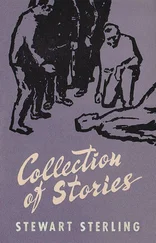Nelson was even more surprised than the prisoner at what he caught himself doing. As they stood Hill up next to him in the corridor, for a minute, waiting for the Black Maria, he breathed over his shoulder, “Hang on tight, or you’re sunk!”
The man acted too far gone even to understand what he was driving at.
Nelson was present the next morning when Mrs. Avram showed up to claim the money, and watched her expression curiously. She had the same air of weary resignation as the night he had broken the news to her. She accepted the money from the captain, signed for it, turned apathetically away, holding it in her hand. The captain, by prearrangement, had pulled another of his little tricks — purposely withheld one of the hundred-dollar bills to see what her reaction would be.
Halfway to the door, she turned in alarm, came hurrying back. “Gentlemen, there must be a mistake! There’s — there’s a hundred-dollar bill here on top!” She shuffled through the roll hastily. “They’re all hundred-dollar bills!” she cried out aghast. “I knew he had a little money in his shoes — he slept with them under his pillow at nights — but I thought maybe, fifty, seventy dollars—”
“There was a thousand in his shoes,” said the captain, “and another thousand stitched all along the seams of his overcoat.”
She let the money go, caught the edge of the desk he was sitting behind with both hands, and slumped draggingly down it to the floor in a dead faint. They had to hustle in with a pitcher of water to revive her.
Nelson impatiently wondered what the heck was the matter with him, what more he needed to be convinced she hadn’t known what she was coming into? And yet, he said to himself, how are you going to tell a real faint from a fake one? They close their eyes and they flop, and which is it?
He slept three hours, and then he went down and checked at the wholesale-drug concern Hill worked for. The firm did not handle cyanide or any other poisonous substance, and the man had a very good record there. He spent the morning working his way down the list of retail druggists who had placed their orders through Hill, and again got nowhere. At noon he quit, and went back to the automat where it had happened — not to eat but to talk to the manager. He was really working on two cases simultaneously — an official one for his captain and a private one of his own. The captain would have had a fit if he’d known it.
“Will you lemme have that busman of yours, the one we had down at headquarters the other night? I want to take him out of here with me for about half an hour.”
“You’re the Police Department,” the manager smiled acquiescently.
Nelson took him with him in his streetclothes. “You did a pretty good job of identifying Hill, the fourth man at that table,” he told him. “Naturally, I don’t expect you to remember every face that was in there that night. Especially with the quick turnover there is in an automat. However, here’s what you do. Go down this street here to Number One-twenty-one — you can see it from here. Ring the superintendent’s bell. You’re looking for an apartment, see? But while you’re at it, you take a good look at the woman you’ll see, and then come back and tell me if you remember seeing her face in the automat that night or any other night. Don’t stare now — just size her up.”
It took him a little longer than Nelson had counted on. When he finally rejoined the dick around the corner, where the latter was waiting, he said: “Nope, I’ve never seen her in our place, that night or any other, to my knowledge. But don’t forget — I’m not on the floor every minute of the time. She could have been in and out often without my spotting her.”
“But not,” thought Nelson, “without Avram seeing her, if she went anywhere near him at all.” She hadn’t been there, then. That was practically certain. “What took you so long?” he asked him.
“Funny thing. There was a guy there in the place with her that used to work for us. He remembered me right away.”
“Oh, yeah?” The dick drew up short. “Was he in there that night?”
“Naw, he quit six months ago. I haven’t seen him since.”
“What was he, sandwich-maker?”
“No, busman like me. He cleaned up the tables.”
Just another coincidence, then. But, Nelson reminded himself, if one coincidence was strong enough to put Hill in jeopardy, why should the other be passed over as harmless? Both cases — his and the captain’s — now had their coincidences. It remained to be seen which was just that — a coincidence and nothing more — and which was the McCoy.
He went back to headquarters. No wire had yet come from Detroit in answer to his, but he hadn’t expected any this soon — it took time. The captain, bulldog-like, wouldn’t let Hill go. They had spirited him away to still a third place, were holding him on some technicality or other that had nothing to do with the Avram case. The bicarbonate of soda trick hadn’t worked, the captain told Nelson ruefully.
“Why?” the dick wanted to know. “Because he caught on just by looking at it that it wasn’t cyanide — is that it? I think that’s an important point, right there.”
“No, he thought it was the stuff all right. But he hollered blue murder it hadn’t come out of his room.”
“Then if he doesn’t know the difference between cyanide and bicarb of soda at sight, doesn’t that prove he didn’t put any on that sandwich?”
The captain gave him a look. “Are you for us or against us?” he wanted to know acidly. “You go ahead checking that list of retail druggists until you find out where he got it. And if we can’t dig up any other motive, unhealthy scientific curiosity will satisfy me. He wanted to study the effects at first hand, and picked the first stranger who came along.”
“Sure, in an automat — the most conspicuous, crowded public eating-place there is. The one place where human handling of the food is reduced to a minimum.”
He deliberately disobeyed orders, a thing he had never done before — or rather, postponed carrying them out. He went back and commenced a one-man watch over the basement-entrance of the Avram house.
In about an hour, a squat, foreign-looking man came up the steps and walked down the street. This was undoubtedly “Uncle Nick,” Mrs. Avram’s husband-to-be, and former employee of the automat. Nelson tailed him effortlessly on the opposite side, boarded the same bus he did but a block below, and got off at the same stop. “Uncle Nick” went into a bank, and Nelson into a cigar-store across the way that had transparent telephone booths commanding the street through the glass front.
When he came out again, Nelson didn’t bother following him any more. Instead, he went into the bank himself. “What’d that guy do — open an account just now? Lemme see the deposit slip.”
He had deposited a thousand dollars cash under the name of Nicholas Krassin, half of the sum Mrs. Avram had claimed at headquarters only the day before. Nelson didn’t have to be told that this by no means indicated Krassin and she had had anything to do with the old man’s death. The money was rightfully hers as his widow, and, if she wanted to divide it with her groom-to-be, that was no criminal offense. Still, wasn’t there a stronger motive here than the “unhealthy scientific curiosity” the captain had pinned on Hill? The fact remained that she wouldn’t have had possession of the money had Avram still been alive. It would have still been in his shoes and coat-seams where she couldn’t get at it.
Nelson checked Krassin at the address he had given at the bank, and, somewhat to his surprise, found it to be on the level, not fictitious. Either the two of them weren’t very bright, or they were innocent. He went back to headquarters at six, and the answer to his telegram to Detroit had finally come. “Exhumation order obtained as per request stop Albert J. Edwards deceased January 1936 stop death certificate gives cause fall from steel girder while at work building under construction stop-autopsy—”
Читать дальше












